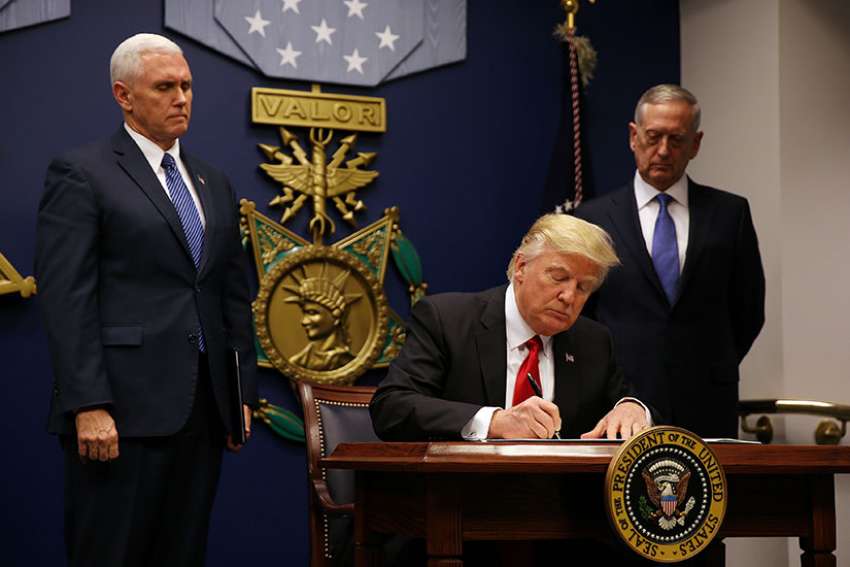The request came Thursday (June 1) in three separate petitions to courts in Richmond, Va., and San Francisco that blocked the president's executive order barring most immigrants from countries deemed at risk for terrorism, as well as international refugees.
Government lawyers asked the justices to let the travel ban go into effect even while they challenge the lower courts' rulings. While that request faces an uphill battle, the high court ultimately could reverse the 4th Circuit and 9th Circuit courts after hearing the case.
"This order has been the subject of passionate political debate," Acting Solicitor General Jeffrey Wall said in legal papers. "But whatever one’s views, the precedent set by this case for the judiciary’s proper role in reviewing the president’s national-security and immigration authority will transcend this debate, this order, and this constitutional moment."
The full U.S. Court of Appeals for the 4th Circuit ruled 10-3 last week against a toned-down version of the original travel ban issued a week after Trump's inauguration in January.
Chief Judge Roger Gregory said revisions removing any mention of religion from the second executive order did not hide the real motive: "President Trump’s desire to exclude Muslims from the United States."
“From the highest elected office in the nation has come an executive order steeped in animus and directed at a single religious group,” Gregory said in the 79-page opinion, which was accompanied by concurrences and dissents from his colleagues.
At the time, Attorney General Jeff Sessions vowed that the case would be appealed to the Supreme Court because it "blocks the president's efforts to strengthen this country's national security."
"As the dissenting justices explained, the executive order is a constitutional exercise of the president's duty to protect our communities from terrorism," he said.
Reaction to the Justice Department's move was swift, with the American Civil Liberties Union denouncing the request.
"We've beat this hateful ban and are ready to do it again," the ACLU said on Twitter. "We will defend our victory and the Constitution."
Meanwhile, a ruling is expected any day in a similar case from a three-judge panel of the U.S. Court of Appeals for the 9th Circuit, based in San Francisco. Rather than wait for that decision, the Justice Department asked that a federal district court's earlier decision striking down the ban be blocked so that it can go into effect.
At issue is Trump's plan to ban most travel from six countries — Iran, Libya, Somalia, Sudan, Syria and Yemen — for 90 days and suspend the entire refugee program for 120 days. The Richmond court blocked the immigration ban, while the district court in Hawaii blocked the refugee ban as well.
Trump first tried to implement the travel ban by signing an executive order on Jan. 27. That order was in effect for seven days before it was blocked by a federal judge in Seattle, a ruling upheld by the 9th Circuit.
Rather than appeal to the Supreme Court, Trump revoked his first travel ban and issued a revised version on March 6. That order was blocked by a federal judge in Hawaii hours before it went into effect, as well as another judge in Maryland. The Justice Department appealed both rulings.
Changes made to the revised ban included exempting thousands of foreign nationals who hold valid visas or green cards. It eliminated Iraq from the original list of affected countries, leaving Iran, Libya, Somalia, Sudan, Syria and Yemen. It contained no preference for religious minorities, while the original had favoured Christians. And it included a waiver process for those claiming undue hardship.
The Supreme Court, finally at full strength with the addition of Trump's nominee, conservative Justice Neil Gorsuch, has divided in the past on immigration issues. Those 4-4 ties, which were commonplace following the death of Justice Antonin Scalia, could tilt in Trump's favour with Gorsuch on the bench.
While seeking to have the lower court decisions blocked so the travel ban can go into effect immediately, the government is not asking the court to hear the case any sooner than next fall, when its 2017 term begins.


